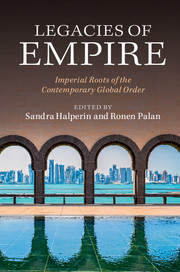Book contents
- Frontmatter
- Contents
- List of figures
- List of tables
- List of contributors
- Acknowledgments
- 1 Introduction: legacies of empire
- Part I Incomplete transitions from empires to nation states
- Part II Legacies of non-European empires in today's world
- 5 The legacy of Eurasian nomadic empires: remnants of the Mongol imperial tradition
- 6 The modern roots of feudal empires: the donatary captaincies and the legacies of the Portuguese Empire in Brazil
- 7 Imperial legacies in the UN Development Programme and the UN development system
- Part III The future legacies of the American Empire
- Index
- References
7 - Imperial legacies in the UN Development Programme and the UN development system
from Part II - Legacies of non-European empires in today's world
Published online by Cambridge University Press: 05 August 2015
- Frontmatter
- Contents
- List of figures
- List of tables
- List of contributors
- Acknowledgments
- 1 Introduction: legacies of empire
- Part I Incomplete transitions from empires to nation states
- Part II Legacies of non-European empires in today's world
- 5 The legacy of Eurasian nomadic empires: remnants of the Mongol imperial tradition
- 6 The modern roots of feudal empires: the donatary captaincies and the legacies of the Portuguese Empire in Brazil
- 7 Imperial legacies in the UN Development Programme and the UN development system
- Part III The future legacies of the American Empire
- Index
- References
Summary
The organizational structure, activities and routines, and original staff of the United Nations system – and, in particular, the UN development system – were, to a significant degree, legacies of late nineteenth-century inter-imperial cooperation. This cooperation, along with the pre-UN international institutions it spawned, was critical to the imperial governments’ strategies of pursuing the most rapid industrial development possible while remaining separate political systems. To encourage growth of the industries of the second industrial revolution, the imperial powers (joined by a few smaller European states) established inter-imperial institutions (rules and organizations) to create and secure a global market for industrial goods. These institutions survived the Great War and the depression, and were re-chartered at the end of the Second World War as the UN system. The organizations of the UN system soon gained fundamentally new capabilities to serve the non-industrialized world, or, at least to serve powerful groups there. The cascading decolonization that began at the war's end eventually made ‘the UN system’ and ‘the UN development system’ (its operations in the less-industrialized world) all but equivalent. From the beginning, the main mechanism coordinating the UN development system has been the UN Development Programme (UNDP) and its immediate predecessors whose original organizational routines and staff came from the wartime institutions that managed the economies of the Allies’ colonies from North Africa to India as part of the war effort, and from men and women who had administered the later, more progressive stages of Roosevelt's Good Neighbor policy in Latin America.
- Type
- Chapter
- Information
- Legacies of EmpireImperial Roots of the Contemporary Global Order, pp. 149 - 170Publisher: Cambridge University PressPrint publication year: 2015
References
- 2
- Cited by



